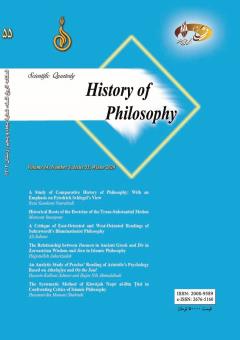-
-
List of Articles
-
Open Access Article
1 - يادداشت سردبير
Hossein Kalbasi Ashtari -
Open Access Article
2 - A Study of Comparative History of Philosophy: With an Emphasis on Friedrich Schlegel’s View
Reza Gandomi Nasrabadi -
Open Access Article
3 - Historical Roots of the Doctrine of the Trans-Substantial Motion
Mansour Imanpour -
Open Access Article
4 - A Critique of East-Oriented and West-Oriented Readings of Suhrawardī’s Illuminationist Philosophy
Ali Babaei -
Open Access Article
5 - The Relationship between Daemon in Ancient Greek and Div in Zoroastrian Wisdom and Jinn in Islamic Philosophy
Hojjatullah Askarizadeh -
Open Access Article
6 - An Analytic Study of Proclus’ Reading of Aristotle’s Psychology Based on Athulujiya and On the Soul
Hossein Kalbasi Ashtar Hajar Nili Ahmadabadi -
Open Access Article
7 - The Systematic Method of Khwājah Naṣīr al-Dīn Ṭūsī in Confronting Critics of Islamic Philosophy
Hesamal-din Momeni Shahraki
-
The rights to this website are owned by the Raimag Press Management System.
Copyright © 2017-2026







